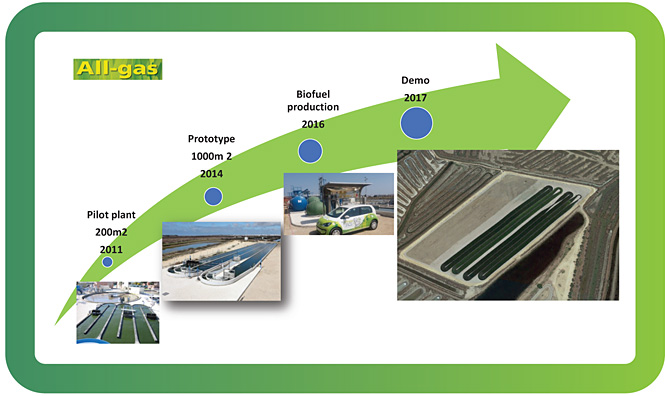To promote the technical
feasibility of Algae Biofuels,
the EU FP7 Energy
programme launched in 2011
three projects on a demonstration
scale. All-Gas is the only one of this
cluster to produce algae and operate
the entire value chain of biofuel
conversion and fl eet demonstration.
The integrated design of energy
efficient wastewater treatment, based
on high-rate algal ponds, allows to
harvest nutrients, while producing
biogas and reuse water without
external energy input.
Full sustainability is reached based on
a circular economy concept, avoiding
dependency on fresh water, arable
land and inorganic fertilizers. The Life
Cycle Assessment (LCA) performed
on the demonstration plant showed
an energy return on investment
(EROI) of 4, changing the paradigm
of effluent treatment from energy
consumer to net energy exporter.
The consortium www.all-gas.eu, led by
Aqualia, demonstrated on large scale
the sustainable production of biofuels
based on low-cost microalgae
cultures. 2 ha of raceway ponds
and related flotation harvesting and
thickening were operated over several
years, with the biomass digested to
biogas and upgraded to biomethane,
which fueled 3 test vehicles that ran
for 70,000km each over two years.

Previous to the implementation of
the Demo phase in 2017, a stepwise
scale up of the process was carefully
designed and implemented in order
to minimize risk. Pilot plants were
installed in 2011. In 2014 the plant
was scaled up to a 1,000m2 prototype
and its respective work and testing
program allowed to confirm key
parameters. A biomass productivity
with a yearly average above 100t/ha
was achieved, and biomethane
yield reached 200L CH4/kg VS. In
May 2016 a first car validated the
microalgae fuel quality produced in
All-Gas project.
The biogas upgrading unit fueled a
test fleet of 3 dedicated vehicles,
as well as 4 other vehicles for
municipal services. To evaluate the
effect of the biomethane on engines,
each test car was monitored over a
70,000km evaluation program. Over
the duration of the project, All-Gas
was able to move the fleet vehicles in
Chiclana around 400,000km, which is
equivalent to travel around the world
10 times.

The demo operation showed that
each hectare of algae culture has
a wastewater treatment capacity
around 1,000m3/d, producing
biomethane above 1,300kg CH4yr
– enough to fuel 20 cars (at
4,5kg/100km and 15,000 km/yr).
This represents four times more than
what is achieved with conventional
biofuels, such as bioethanol from
sugarcane or biodiesel from palm oil,
both yielding about 5,000L/ha/yr.
Additionally to renewable energy
production, the circular economy
concept of the all-gas project
signifi cantly reduces the electricity
required to treat wastewater.
Compared to conventional processes,
for each 1,000m3/d treated around
0.4kwhm3 can be saved - equivalent
to the yearly electricity consumption
of more than 20 people. Extraction
of lipids was also demonstrated with
BDI's RepCat process, producing a
few liters of algae-biodiesel within
the specifi cation of EN 14214 except
for the sulphur content. Some of
the results are included in the new
documentary Brave Blue World.
Brave Blue World trailer